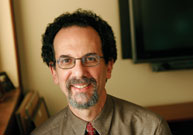Entre Nous with Associate Provost, Academic Programs and Services, Morton Mendelson
Entre Nous with Associate Provost, Academic Programs and Services, Morton Mendelson McGill University
User Tools (skip):
Entre Nous with Associate Provost, Academic Programs and Services, Morton Mendelson
Research, teaching, and lots of committees

Morton Mendelson was one of the driving forces behind the creation of the Bachelor of Arts and Sciences degree in 2004.
Owen Egan
This past summer, Morton Mendelson, professor of psychology and former associate dean of science, academic affairs, moved into the James Building to begin a five-year stint as associate provost, academic programs and services. One early priority involves exploring the teaching/research nexus.
Q: Your job title is a new one — what does the position entail?
A: I took over the responsibilities of the associate provost, academic programs, and the associate provost, academic services. It seems a bit funny to list all the committees I'm on, but it's one way of defining my job. So on the academic program side, I'm chair of Academic Policy and Planning Committee (APPC), Sub-Committee on Courses and Teaching Programs (SCTP), and I'm overseeing part of the course and program approval process as well as the academic program review processes. For the latter, all faculties are reviewing their academic programs to identify areas for improvement or where they want to change programs. On the academic services side, I'm chair of the university admissions committee and of the APPC Sub-Committee on Teaching and Learning (SCTL). One thing we are focusing on is the relationship between teaching and research. And of course there are purely administrative parts of this job — I'm running an advisory work group on class scheduling and a work group on course proposal work flow, for instance.
It seems that the relationship between teaching and research is becoming more important. The Faculty of Science has initiated an Office of Undergraduate Research, for instance. Where is this heading?
Yes, in the process of identifying their priorities, the Faculty of Science singled out the research-teaching connection. I was involved in those discussions and we are now having them at the university level. McGill prides itself on being a research-intensive university, so what are the implications of that for teaching? The academic program reviews are looking at how research has been included in academic programs, and on the SCTL we are trying to refine what we mean by the link between teaching and research. There are many ways in which it could be conceived — it isn't only having students do research in a professor's lab. So we want to raise awareness and bring coherence to the discussion about teaching and research. I think we'll find that McGill is doing a lot in this area, but we are not always aware of the things we — and others — are doing. By discussing the issues across the university, we'll be able to identify programs where this relationship is being developed very successfully and use them as models for other programs.
We can talk about research and teaching in terms of content or of methods. In terms of the former, you have content in courses that reflect a professor's research or contemporary research in the field; you have research content in courses that concerns how to do research in a particular field; or you can have content in courses that are generically related to research. And alternatively, research can inform teaching in a number of ways. In addition to various forms of research directly on pedagogy, you can have research methods taught in courses, such as inquiry-based learning projects. And, broadly, we must ensure that our students read their field's research literature and understand the research processes and the scientific, philosophical and historical issues related to this research.
You are on plenty of committees. These activities make one of your roles appear to be that of the master coordinator. Is this an accurate perception?
Well, part of the job is certainly figuring out how to best get things done. We're identifying areas of importance and goals, bringing people into discussions about these issues, and then moving forward. Sometimes the left hand doesn't know what the right hand is doing and, more seriously, occasionally doesn't even know that there is a right hand. So part of my goal is to bring together interested parties, make sure people have discussions about issues we need to deal with, and find ways we can do it better, with the goal of serving students, faculties and departments better.
While much of your job at this early stage involves carrying out plans initiated by your predecessors, you have begun some new projects. What other initiatives are on the horizon?
As well as the research and teaching initiative for the SCTL, which is new, I'll soon be chairing a work group looking at programs and services for aboriginal students. Aboriginal issues are dealt with in a number of different places at McGill — there is First Peoples' House, there are programs directed towards aboriginal students, issues related to recruitment, financial support considerations, course content issues. The question is, should the university make a more concerted effort to coordinate and deal with these issues? That's what we will be looking into. We also have a new AAPC work group on grading, which will examine some issues people have raised about grading policies.
Your new job seems to have some overlap with your last position as associate dean, academic, in the Faculty of Science. How is the transition so far?
Part of it is new, and part is familiar. As associate dean academic in science, I was involved with the academic program review and admissions, and I sat on the Committee on Student Affairs, as I do now. But there are many new responsibilities too. The main difference, though... I thought I was busy before, but this is high octane all the time.

